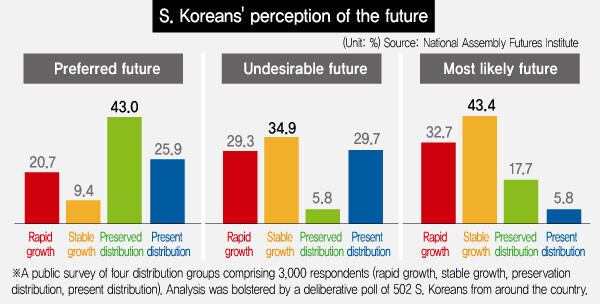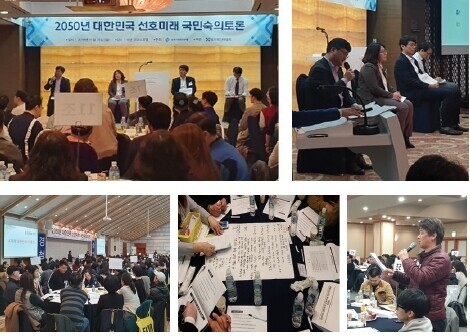hankyoreh
Links to other country sites 다른 나라 사이트 링크
S. Koreans view environmental concerns as most important issue for future society

South Koreans view environmental concerns such as climate change as the most important issues for future society and name a “preserved distribution” society, where current resources are effectively preserved for future generations, as their preferred vision for the future, poll findings show. Respondents named a continuation of the current growth- and competition-centered society as the future they most hoped to avoid -- but also predicted it as the most likely form that it will actually take.
The National Assembly Futures Institute (NAFI) recently published a report on its homepage showing the results from a deliberative poll on 502 South Korean adults on “preferences for the future.” It was the first-ever study to adopt a deliberative polling approach to investigate South Koreans’ preferred vision for the future using a sample population selected to reflect regional and age distributions. Deliberative polling is a format in which public opinions are established by providing participants with prior information before gathering their opinions.
As a preliminary step, the researchers surveyed 3,000 people to establish the preferred values of South Koreans. Deliberative poll participant groups were then formed to match the distribution of responses for those values. The researchers identified four preferred values for South Koreans: rapid growth, stable growth, preserved distribution, and present distribution. The rapid growth orientation focuses on technological innovation, individuals, growth, change, and future value. The stable growth orientation pursues gradual change with a focus on the present. The preserved distribution orientation pursues technological innovation and change while also emphasizing community, distribution, and equality as important concerns. The present distribution orientation approaches the same values with a focus more on present generations than future ones.

Poll participants chose environmental concerns such as climate and energy as the most important issue for the future (59.6%). Not far behind in second place were job issues (51.4%) related to artificial intelligence, social services, and labor. Other concerns were much farther down the list of priorities, including housing (24.3%), health (22.3%), family (20.3%), politics (12.2%), and national security (9.4%).
The form of future society most preferred by respondents was “preserved distribution” (43.0%), which received much more support than “present distribution” (25.9%), “rapid growth” (20.7%), or “stable growth” (9.4%) types. A preserved distribution society pursues community, distribution/equality, a high level of social services with a high tax burden, new and renewable energy, a flexible concept of “family,” risk-taking, and change. It’s an orientation that involves checking the desires of the current generations in order to leave a better future for posterity. Park Seong-won, director of the NAFI innovation growth group, identified the three major characteristics of a preserved distribution society as “a proactive response to climate change,” “loose family relations,” and “diversity of values.”
Preserved distribution society named most preferred form of future
But respondents named a “stable growth” society as the most likely one to actually come about (43.4%) -- meaning that they expect society to head in a direction of pursuing stability over change, including an emphasis on large cities, continued growth, efficiency, and a tepid response to climate issues. Over one in three respondents (34.9%) named this kind of future as the one they most hoped to avoid.
Similar findings were found in a survey of 65 experts, with 63.1% of them stating the preserved distribution society as their preferred future. They also named a “stable growth” future both as the most likely to occur (38.5%) and the one they most hoped to avoid (43.1%).
“It’s significant that at a time when environmental destruction and the growth of cities have been cited as root causes behind the spread of infectious diseases like COVID-19, the preserved distribution society was named as the most preferred form of future,” the researchers said.
Park Seong-won predicted, “South Koreans will come to hope for the arrival of a preserved distribution society even more as the pandemic stretches on.”
The process for the deliberative poll on preferences for the future began in November of last year with a division of South Korea into three regions for a preliminary online deliberation, followed by a preliminary questionnaire, a discussion on seven issues, a discussion on four preferred visions for the future, a Q&A session with experts, and a post-questionnaire.
By Kwak No-pil, senior staff writer
Please direct comments or questions to [english@hani.co.kr]

Editorial・opinion
![[Column] When ‘fairness’ means hate and violence [Column] When ‘fairness’ means hate and violence](https://flexible.img.hani.co.kr/flexible/normal/500/300/imgdb/original/2024/0516/7417158465908824.jpg) [Column] When ‘fairness’ means hate and violence
[Column] When ‘fairness’ means hate and violence![[Editorial] Yoon must stop abusing authority to shield himself from investigation [Editorial] Yoon must stop abusing authority to shield himself from investigation](https://flexible.img.hani.co.kr/flexible/normal/500/300/imgdb/original/2024/0516/4417158464854198.jpg) [Editorial] Yoon must stop abusing authority to shield himself from investigation
[Editorial] Yoon must stop abusing authority to shield himself from investigation- [Column] US troop withdrawal from Korea could be the Acheson Line all over
- [Column] How to win back readers who’ve turned to YouTube for news
- [Column] Welcome to the president’s pity party
- [Editorial] Korea must respond firmly to Japan’s attempt to usurp Line
- [Editorial] Transfers of prosecutors investigating Korea’s first lady send chilling message
- [Column] Will Seoul’s ties with Moscow really recover on their own?
- [Column] Samsung’s ‘lost decade’ and Lee Jae-yong’s mismatched chopsticks
- [Correspondent’s column] The real reason the US is worried about Chinese ‘overcapacity’
Most viewed articles
- 1China calls US tariffs ‘madness,’ warns of full-on trade conflict
- 2[Column] US troop withdrawal from Korea could be the Acheson Line all over
- 3[Editorial] Yoon must stop abusing authority to shield himself from investigation
- 4[Column] When ‘fairness’ means hate and violence
- 5[Column] How to win back readers who’ve turned to YouTube for news
- 6US has always pulled troops from Korea unilaterally — is Yoon prepared for it to happen again?
- 7[Book review] Who said Asians can’t make some good trouble?
- 8Naver’s union calls for action from government over possible Japanese buyout of Line
- 9Could Korea’s Naver lose control of Line to Japan?
- 10[Editorial] Korea must respond firmly to Japan’s attempt to usurp Line